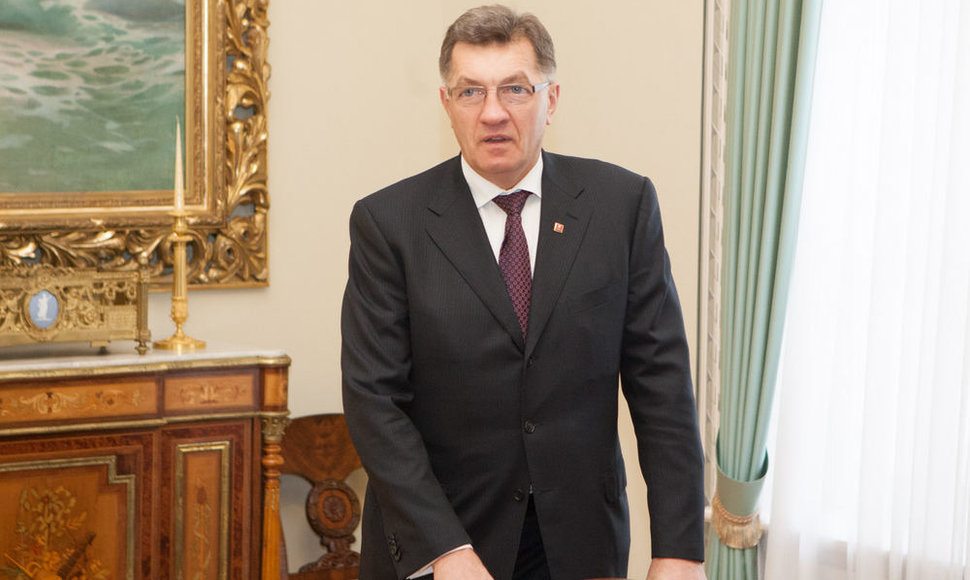In his words, the projected center-left coalition is sticking to its intentions of raising minimum monthly wages to 1,000 litas (EUR 289.9) starting next year but plans to decide on a specific number later this week following an analysis of burden to the state budget. The Social Democratic Party's leader said Lithuania should adopt the euro in 2015.
"The fiscal deficit will have to remain as planned – 2.5 percent of the GDP. Our challenge is that Lithuania has the euro de facto. I believe that 2015 is a realistic date for adopting the euro, given the macroeconomic indicators and the financial perspective," Butkevičius told journalists on Monday. Butkevičius is considered among the most realistic candidates for prime minister.
"We spoke about raising the minimum monthly salary to 1,000 litas starting 1 January (...). We asked for calculations over the next few days in connection to the additional costs to be incurred by the public sector and ways of compensation of the rise in additional costs. I believe we will agree on specific figures in the end of the week," he said.
Butkevičius, who has served as minister of finance and transport and communication in the past, has refused to specify the person who could be appointed as the finance minister. In his words, personalities should be announced within two weeks.
Among the first tasks of the new government, he referred to renovation of Soviet-built residential buildings and restructuring of the heating sector, which would enable using less gas and more biofuel for heating.
The Social Democrats will have 38 mandates in the new 141-seat parliament, independent candidate Andrius Palionis plans to join the party. The Social Democrats are holding coalition talks with the Labour Party (29 mandates) and the Order and Justice party with 10.
In favour of nuclear energy, against Visaginas NPP
Butkevičius also said he was in favour of nuclear energy, yet he was so far not inclined to support the project of Visaginas Nuclear Power Plant (VNPP) which is being implemented in strategic partnership with Japan’s Hitachi.
“I can state very responsibly that we are in favour of nuclear energy. Democratic countries consider such strategic projects for a year and a half or two years. This project was put together hastily and the main reason of that were the approaching general elections and the wish to show to the society that this government has done something,” Butkevičius said at a news conference on Monday.
“We are against the implementation of this project for the meantime,” he said in response to the question whether it was possible that Hitachi, the current strategic investor in the new nuclear facility, would still build the plant.
Meanwhile Lithuania’s project on the construction of a liquefied natural gas (LNG) terminal shall be implemented as quickly as possible, Butkevičius says.
“It is a No 1 project. It shall be implemented as quickly as possible but it would be very advantageous if this project became a regional project that could be implemented together with Latvia and Estonia. It would be more advantageous in commercial terms,” Butkevičius said at a news conference on Monday.
Ex-defence minister to head foreign policy
Butkevičius promised on Monday that Lithuania's foreign policies would not change, hinting that Linas Linkevičius, Ambassador to Belarus, was among candidates for the foreign minister.
"We will work to retain good relations with neighboring countries but we have no intentions of revising the direction of foreign policy," Butkevičius told journalists, emphasizing that “foreign policies are a responsibility of the president of the Republic.”
"The Ministry of Foreign Affairs is some kind of a performer of tasks formulated by the government and, first of all, by the president of the Republic. It is very important for the prime minister to have good communication with the President's Office and the government," Butkevičius said.
He said that Linkevičius, former defense minister and ex-ambassador to NATO, was "one of the candidates" considered for heading the Foreign Ministry. Butkevičius refused to specify other candidates.
The Social Democratic leader said the position of foreign minister was even more important in the light of Lithuania's upcoming presidency over the European Union (EU). He said that procrastinated negotiations over the new 2014-2020 EU budget may result in an agreement during Lithuania's presidency in the second half of 2013.
"The post of the foreign minister is always important, however, Lithuania will face key tasks in the second semester of next year. Presidency over the EU Council is a major challenge and Lithuania may even have to reach final agreement on the new 2014-2020 financial perspective," Butkevičius said.












